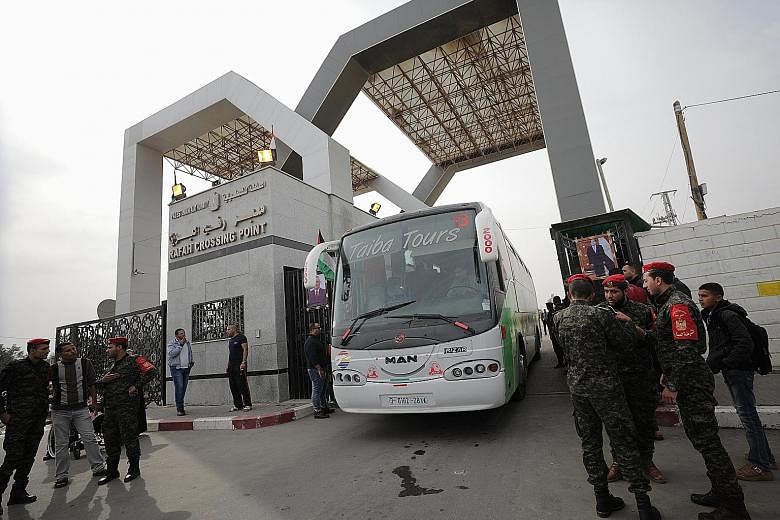Two months ago, the rival Palestinian factions Hamas and Fatah spoke of a "historic reconciliation" when Hamas agreed to cede power in the Gaza Strip.
Now, the deal is faltering as both sides continue to cling to power and distrust each other.
After 10 years of a gory feud that has split and paralysed Palestinian society, this outcome is hardly surprising. When the new agreement was signed, even sceptics rubbed their eyes in disbelief.
Could the Oct 12 agreement - which both sides signed in Cairo under Egyptian supervision - end the fratricide that numerous other bids at reconciliation could not?
The beginning seemed promising to some. Following the agreement, Islamist group Hamas removed its officers early last month from Gaza's three border crossings in Erez, Rafah and Karni in a highly symbolic move to let the Fatah-controlled Palestinian Authority (PA) take over.
PA ministers from the West Bank, once barred by Hamas, began to visit Gaza regularly.
Things seemed to advance so well that the United Nations Coordinator for Humanitarian Aid and Development Activities Robert Piper wrote an article in The Independent about "stirrings of hope".
But reality soon kicked in.
Last Wednesday, two days before Hamas - which took control of Gaza in a bloody coup in 2007 - was supposed to hand the strip over to the PA, Mr Fayez Abu Eitah, a Gaza-based Fatah official, read out a joint statement.
Both factions "requested that the Egyptian brothers postpone the completion of the (PA) government's takeover… from Dec 1 to Dec 10" in order "to complete the arrangements to guarantee the achievement of reconciliation".
But that reconciliation increasingly appears unattainable.
Mr Hussein Al-Sheikh, a senior Fatah official, set out the problem: "The Palestinian government did not receive control (of) even 5 per cent of its areas of responsibility in Gaza: not administratively, not financially and not as it pertains to security matters."
The new arrangements at the border crossings illustrate Mr Al-Sheikh's point.
When Fatah officials entered the offices in Rafah on the border with Egypt, they found that Hamas had taken the "computers, files, desks, even the chairs", a diplomatic source told The Sunday Times.
They are forced to remain unarmed as well. Hamas guards, whose comrades had thrown PA officials from rooftops 10 years ago, supposedly "protect" them now.
Anyone who wants to use the crossing has to go to a nearby sports facility for Hamas to decide who can leave. This has long become an informal source of revenue for the Islamist group, as people are allegedly forced to buy their way to the top of a long list. The only thing left for PA officials to do is to rubber-stamp Hamas' permits.
In the light of this, Fatah's top negotiator Azzam al-Ahmad accused Hamas in an interview with Agence France-Presse last Wednesday that it was "not committed" to the Cairo agreement.
Neither has the PA been particularly forthcoming in the West Bank. Gaza residents still receive only four to six hours of electricity each day after PA President Mahmoud Abbas cut payments to the Israeli supplier.
Delivery of medical supplies has been restored but only intermittently, while the number of permissions granted to those who need to go to the West Bank for medical treatment has not been increased.
PA security forces continue to arrest dozens of Hamas operatives, who, on their part, attempt to perpetrate terror attacks. Mr Abbas "believes that only extreme pressure brought Hamas to the negotiation table, and that is why he wants to maintain it", diplomatic sources in Ramallah suggested.
More importantly, the most contentious issues have not been sorted out. One is the fate of tens of thousands of civil servants.
When Hamas took control of Gaza, the PA told its 70,000 civil servants there not to do Hamas' bidding. They received their salary to stay at home.
Hamas then hired up to 50,000 new civil servants from among its own political constituency.
After reconciliation, there will have to be massive layoffs as both sides cannot support a bloated public service. Fatah reportedly offered to take over some 8,000 Hamas employees, but the Islamists want all 50,000 to stay.
Nothing, however, is as delicate as the army Hamas has built in Gaza that has already fought three bloody wars with Israel and keeps a tight grip on the strip.
Mr Abbas had said he wanted to prevent a "Lebanonisation" of Gaza, which means paying for all of Gaza's expenses and shouldering the responsibility for its residents while real power remains with Hamas, who can decide whether to pursue war or peace.
Mr Al-Sheikh had insisted: "Arms are not an issue relating to a certain faction. There will be only a single law with a single weapon."
Hamas, however, sees things differently. Mr Khalil al-Hayya, its deputy leader in Gaza, declared last week: "The weapons of the resistance are our dignity and we will permit no discussion on this."
Mr Ghassan Khatib, a former PA minister, believes the decision to delay the handover of power in Gaza was made under pressure from the Egyptian delegation.
Cairo is heavily invested in this political process and "wants success, so they suggested 10 days and promised to continue to put pressure on the two sides", he said.
With no end to the differences in sight, the requested delay could turn out to be indefinite.

